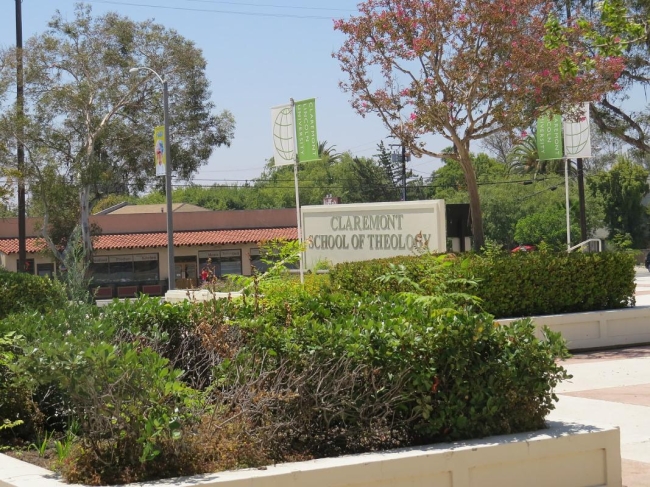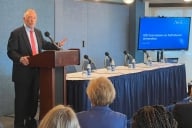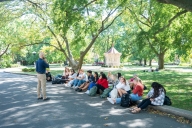You have /5 articles left.
Sign up for a free account or log in.

The Claremont School of Theology
selemitchell/Wikimedia Commons
A years-long legal battle between the Claremont School of Theology and the Claremont Colleges continues over the fair purchase price for a parcel of land.
At the heart of the dispute is an agreement from 1957 that requires the Claremont School of Theology to sell its property to the Claremont Colleges for only $4 million -- well under the land’s current market value. Disagreements over the validity and interpretation of this agreement, as well as the value of the School of Theology campus, landed the two institutions in court.
Once good partners, the institutions are now fiercely divided over the value of this 10-acre plot. The Claremont Colleges asserts that its original offer of $14 million is more than fair given the condition of the property and zoning limitations. The School of Theology, which had its entire campus appraised for nearly $40 million, needs a significant influx of cash to stay open and would like to sell the land at a higher price.
“We have to monetize the land -- either sell the land or lease the land -- in order to survive,” said Kah-Jin Jeffrey Kuan, president of the ecumenical and interreligious theology school.
The legal dispute has been extended through at least December, when the court will decide whether the Claremont Colleges waived its right of first offer in 2015 when it failed to act on the 1957 agreement, Kuan said.
Despite sharing the Claremont name, the Claremont School of Theology is not part of the seven-institution Claremont Colleges consortium in Southern California. In 1957, after splitting from the University of Southern California, the School of Theology purchased a 16.4-acre plot of land from the Claremont Colleges that had been bought by the Scripps family, who founded Scripps College and purchased land for several of the Claremont colleges.
The consortium and theology school were good neighbors for many years, according to Kuan. The School of Theology worked closely with the Claremont Graduate School -- now the Claremont Graduate University -- on a Ph.D. program for religion. Some consortium students can cross-register for classes at the School of Theology, and students and faculty at both institutions share library access.
“Up until we began negotiating the land, the relationship continued to be a good one,” Kuan said. “We have contributed a lot to the colleges, sometimes at our own expense.”
The School of Theology has always been a poor institution, Kuan said, and its financial challenges have mounted in recent years. Enrollment at the graduate institution has declined over the past decade, and more students are opting for online or hybrid education models, leaving the institution with little use for its entire campus.
The Board of Trustees decided in 2015 to downsize and sell about 10 acres of the campus. The theology school would still operate in Claremont on a smaller footprint and use the additional revenue to secure the institution’s future. The institution had the 16.4-acre parcel of land -- which sits in a wealthy part of Southern California -- appraised at nearly $40 million.
But the School of Theology can’t just list the property and sell to the highest bidder. When the theology school bought the land in 1957, it inked a deal with the Claremont Colleges to sell the land back to the consortium for only $4 million if it ever decided to sell the campus. This agreement was reaffirmed in 2001, before Kuan became president of the school. It was acknowledged again in 2006, though then president Jerry Campbell “did not agree to reaffirm the agreement” at that time, according to Steve Horswill-Johnston, a spokesperson for the theology school.
Stig Lanesskog, CEO of the Claremont Colleges consortium, tells it differently. When Campbell met with consortium officials to reaffirm the agreement, “there wasn’t any discussion about changing those dynamics, including the formula of [purchase] price,” Lanesskog said.
When Kuan approached the Claremont Colleges with his intent to sell the land, the consortium offered $14 million for the property, which Lanesskog said was a fair market price. “Our offer of $14 million for that 10.59-acre parcel was actually a true market-based valuation, whereas theirs was a flawed evaluation,” Lanesskog said.
The Claremont Colleges solicited a third-party peer review of the School of Theology’s appraisal and identified several issues, Lanesskog said. The appraisal was based on commercial use, but it is currently zoned for educational use only. The conditions of some buildings are below average, and at least one property has inadequate parking.
Lanesskog is sympathetic to the theology school’s financial position, he said. That’s why the consortium’s original offer was $10 million more than what the 1957 agreement required.
“Over five years ago, we offered almost three, four times more for a portion of the property, and we were going to redo their housing at our cost and allow them to rent that back,” he said. “Their response was to sue us.”
The School of Theology sued the consortium in 2016. The lower court sided with the theology school, ruled that the 1957 restriction was no longer applicable and valid, and stated that the institution should receive fair market value for the land. The consortium appealed. In January and June of 2021, the appellate court ruled in Claremont Colleges’ favor, arguing that the theology school must sell the land back to the consortium at the price agreed upon in 1957.
Most recently, the Claremont Colleges filed for an entry of final judgment, which would require the School of Theology to sell the land to the consortium at the $4 million price. On Friday, Judge Peter A. Hernandez of the Superior Court of Los Angeles County delayed a final judgment and instead set a Dec. 9 hearing to gather additional documentation and determine whether the Claremont Colleges waived its right of first offer.
“We remain confident in our position and look forward to reacquiring the land so it can be used by The Claremont Colleges for educational purposes, as it was intended,” Lanesskog said after the hearing.
Five years after the theology school filed suit, the two are still at odds. As a bystander, it’s impossible to know who is in the right, said Larry Ladd, a senior consultant at the Association of Governing Boards of Universities and Colleges. He suggested that a possible solution could be binding arbitration, during which the two institutions would agree to follow a compromise determined by a neutral third party.
Institutions watching the legal battle should heed its warning, Ladd said.
“Usually, transactions don’t try to control the future, or predict the future, because you can get into situations like this,” Ladd said. “When you do a transaction, remember that you’re walking away from the other party at that point, and try to avoid any complications.”








